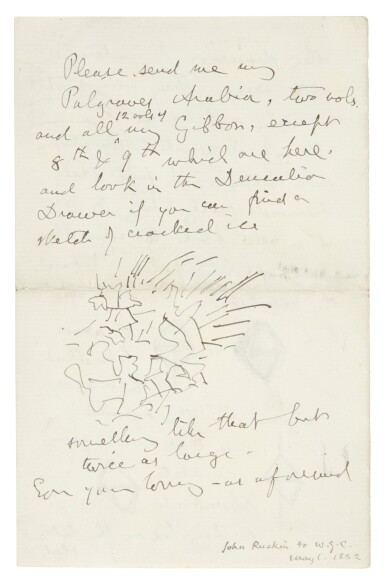
John Ruskin | A fragment of an autograph letter, to W.G. Collingwood, with a sketch of flowers
Lot Closed
July 20, 03:01 PM GMT
Estimate
1,000 - 1,500 GBP
Lot Details
Description
John Ruskin
A collection including a fragment of an autograph letter, and a sketch of flowers:
i) fragment of an autograph letter signed, to W.G. Collingwood, written in the aftermath of Ruskin's breakdown in Spring 1882, asking to be sent Palgrave's Arabia and several volumes of Gibbon as well as "a sketch of cracked ice", including a sketch demonstrating the drawing he was referring to, overleaf, notes concerning diamonds, octohedrons and rhomboids with sketches outlining their respective symmetries and assymetries. Later note "John Ruskin to W.G.C. May 1. 1882" in Collingwood's hand, 1 page (179 x 115mm.) 8vo, creased where folded.
ii) pencil and watercolour illustration of flowers probably by Ruskin, a pencil note to the lower edge writes "Bottom. Hold it this way." 1 page, (127 x 81mm.), 8vo, slightly soiled.
iii-iv) two further letters, relating to provenance of (i): a covering letter from Collingwood, Coniston sending it to a Mr Cooke ("Mr Ruskin is not well enough to write autographs nowadays"); letter from Cooke to Mrs Norton concerning a request for autographs; 2 pages (180 x 114mm.), 8vo, Coniston and Hampstead, 28 and 29 April 1899
The delicately rendered image demonstrates Ruskin's passion for drawing from nature and specifically drawing leaves. In Modern Painters, Vol. V, there is an entire section entitled On Leaf Beauty, in which Ruskin states, "If you can paint one leaf, you can paint the world."
Ruskin suffered a number of mental breakdowns during his life. The 1882 letter illustrates his severe and rapid decline following his libel trial against James McNeill Whistler and consequent tarnishing of Ruskin's reputation, as well as the death of Ruskin's cherished student Rose La Touche in the late 1870s. A full breakdown occurred in March 1882, and the letter is from Ruskin's period of recovery at Herne Hill, London. W.G. Collingwood, who was Ruskin's assistant and helper in his later years, states in his letter that "Mr Ruskin is not welll enough to write autographs nowadays." Ruskin died the following January at Brantwood.
You May Also Like









